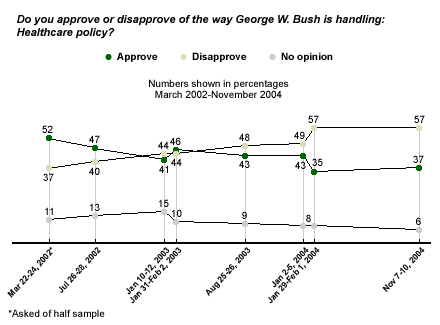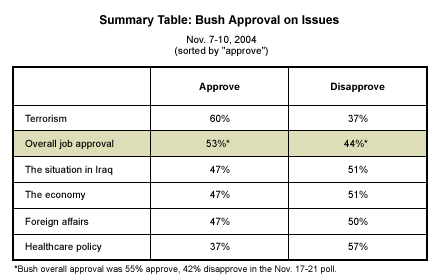Now that the presidential election is over, Americans can gratefully enjoy a three-year reprieve from heated campaign rhetoric and turn their attention to the Bush administration's second-term policy adjustments. Progress on George W. Bush's healthcare strategies, which he outlined after re-election, is likely to be closely monitored.
Many Americans will be looking for course corrections. In Gallup's first post-election poll on healthcare issues*, Americans give the president relatively low marks on his current handling of healthcare policy. More Americans say they disapprove than approve of Bush's handling of healthcare, 57% to 37% -- an evaluation that is essentially unchanged from a poll taken in late January 2004, when 57% disapproved and 35% approved.

Disapproval of healthcare policy has not always characterized Bush's presidency. The recent ratings contrast sharply with public opinion in March 2002, when Gallup first asked this question about Bush. At that time, the results were nearly reversed, with a slim majority (52%) approving of the president's healthcare policy and 37% disapproving. Despite sweeping changes to Medicare and prescription drug benefits in 2003, approval has been on a slow downward trend.
Across many basic demographic groups (men and women, young and old), Americans are more likely to disapprove than approve of the president's management of healthcare policy. Partisan differences are clearly evident, however, with two-thirds of Republicans (67%) approving of Bush's handling of healthcare policy, compared with only 1 in 10 Democrats (11%).
Healthcare policy is a weak spot for the Bush administration compared with other key domestic and international issues. Of the five specific issues that Gallup asked about in the recent poll, Bush's handling of healthcare has the lowest approval rating. Bush performs best on his handling of terrorism, with 6 in 10 Americans supporting his policies in that area, and 47% of Americans approve of the president's handling of Iraq, foreign policy, and the economy. Bush's overall job approval rating at the time of the Nov. 7-10 survey fell somewhere in the middle, at 53%.

Bottom Line
The healthcare legislation passed during Bush's first term in office -- including a bill granting prescription drug benefits to Medicare recipients, and legislation allowing tax-free health savings accounts and allocating funds for healthcare information technology -- has not had the desired effect on public perceptions of Bush's handling of healthcare. Finding a way to stem the large and growing number of Americans who lack health insurance (45 million in 2003) may be the only likely remedy for Bush's lackluster approval ratings on healthcare policy.
*These results are based on telephone interviews with 1,016 national adults, aged 18 and older, conducted Nov. 7-10, 2004. For results based on the total sample of national adults, one can say with 95% confidence that the maximum margin of sampling error is ±3 percentage points. In addition to sampling error, question wording and practical difficulties in conducting surveys can introduce error or bias into the findings of public opinion polls.